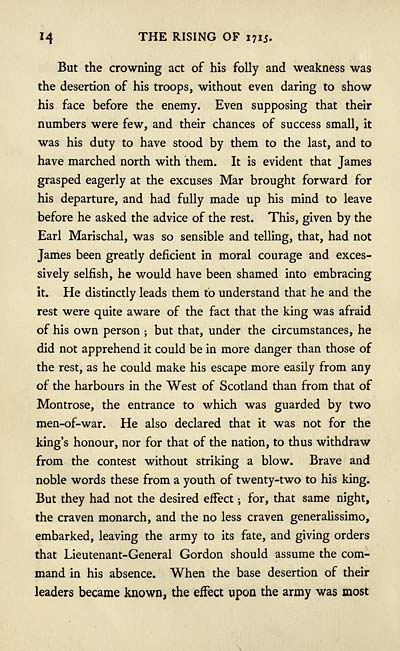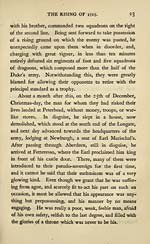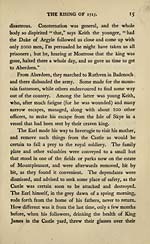Memoir of Marshal Keith
(30) Page 14
Download files
Complete book:
Individual page:
Thumbnail gallery: Grid view | List view

14 THE RISING OF 1715.
But the crowning act of his folly and weakness was
the desertion of his troops, without even daring to show
his face before the enemy. Even supposing that their
numbers were few, and their chances of success small, it
was his duty to have stood by them to the last, and to
have marched north with them. It is evident that James
grasped eagerly at the excuses Mar brought forward for
his departure, and had fully made up his mind to leave
before he asked the advice of the rest. This, given by the
Earl Marischal, was so sensible and telling, that, had not
James been greatly deficient in moral courage and exces-
sively selfish, he would have been shamed into embracing
it. He distinctly leads them to understand that he and the
rest were quite aware of the fact that the king was afraid
of his own person ; but that, under the circumstances, he
did not apprehend it could be in more danger than those of
the rest, as he could make his escape more easily from any
of the harbours in the West of Scotland than from that of
Montrose, the entrance to which was guarded by two
men-of-war. He also declared that it was not for the
king's honour, nor for that of the nation, to thus withdraw
from the contest without striking a blow. Brave and
noble words these from a youth of twenty-two to his king.
But they had not the desired effect ; for, that same night,
the craven monarch, and the no less craven generalissimo,
embarked, leaving the army to its fate, and giving orders
that Lieutenant-General Gordon should assume the com-
mand in his absence. When the base desertion of their
leaders became known, the effect upon the army was most
But the crowning act of his folly and weakness was
the desertion of his troops, without even daring to show
his face before the enemy. Even supposing that their
numbers were few, and their chances of success small, it
was his duty to have stood by them to the last, and to
have marched north with them. It is evident that James
grasped eagerly at the excuses Mar brought forward for
his departure, and had fully made up his mind to leave
before he asked the advice of the rest. This, given by the
Earl Marischal, was so sensible and telling, that, had not
James been greatly deficient in moral courage and exces-
sively selfish, he would have been shamed into embracing
it. He distinctly leads them to understand that he and the
rest were quite aware of the fact that the king was afraid
of his own person ; but that, under the circumstances, he
did not apprehend it could be in more danger than those of
the rest, as he could make his escape more easily from any
of the harbours in the West of Scotland than from that of
Montrose, the entrance to which was guarded by two
men-of-war. He also declared that it was not for the
king's honour, nor for that of the nation, to thus withdraw
from the contest without striking a blow. Brave and
noble words these from a youth of twenty-two to his king.
But they had not the desired effect ; for, that same night,
the craven monarch, and the no less craven generalissimo,
embarked, leaving the army to its fate, and giving orders
that Lieutenant-General Gordon should assume the com-
mand in his absence. When the base desertion of their
leaders became known, the effect upon the army was most
Set display mode to:
![]() Universal Viewer |
Universal Viewer | ![]() Mirador |
Large image | Transcription
Mirador |
Large image | Transcription
Images and transcriptions on this page, including medium image downloads, may be used under the Creative Commons Attribution 4.0 International Licence unless otherwise stated. ![]()
| Histories of Scottish families > Memoir of Marshal Keith > (30) Page 14 |
|---|
| Permanent URL | https://digital.nls.uk/94836418 |
|---|
| Description | A selection of almost 400 printed items relating to the history of Scottish families, mostly dating from the 19th and early 20th centuries. Includes memoirs, genealogies and clan histories, with a few produced by emigrant families. The earliest family history goes back to AD 916. |
|---|

